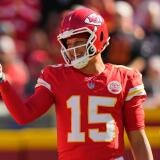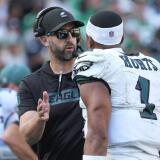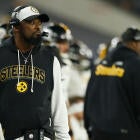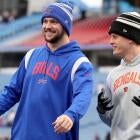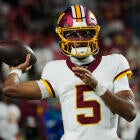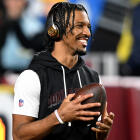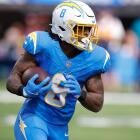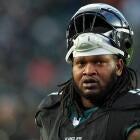No Fans Allowed? How home-field advantage could be affected in NFL season without full stadiums
The third in CBS Sports' three-part series on what a season without full stadiums would mean for the NFL
If the home team plays a game in its home stadium but there are no fans to see it, was there ever an advantage?
The question of what drives home-field advantage across sports may finally be answered in this 2020 season if no or few fans are allowed in stadiums. Major League Baseball already has announced a proposal for a no-fans start to its season. But the fan effect on American sports is most frequently discussed in football, and those around the NFL are weighing options that could include a no-fans 2020 season, part of an attempt to keep the sport afloat and fulfill TV contracts that pay most of the bills.
Bettors and statisticians alike are wondering whether we'll see the (continued) disappearance of home-field advantage.
"If there's no crowd attending then I think the home-field advantage diminishes even more," says Thomas Dohmen, professor of applied microeconomics at University of Bonn and author of one of the foremost studies on home-field advantage.
In the 1990s, NFL home teams won about 60 percent of the time. Last season, it hovered around 52 percent. In 2000, home-field advantage was worth about 2.9 points. Today, it averages around 2.2 points. Curiously, home-field advantage was actually negative last season -- we'll get to that later.
Over the years and across various studies, most of the general thoughts we've had on what causes home-field advantage in the NFL have been debunked. Travel has no discernible impact on it. Noise to create false start penalties doesn't either. A cold-weather team going to a warm city fares no better or worse than anyone else. The crowd boosting home team performance is also unproven.
But the crowd's impact on the officials? Studies are almost unanimous that crowds have a substantial and identifiable effect on calls made for the home team and against the visitors.
"This is one of the biggest factors; it's not the only one," says Tobias Moskowitz, professor at Yale's School of Business and co-author of Scorecasting, the 2010 book that popularized the theory of officials' impact on home-field advantage. "I would have said the same thing 10 years ago before I was looking at this: That referees, maybe they play a small role, but that can't be the driving force behind it. But actually when you look at the data, you're hard-pressed to find other things that matter.
"It's never perfect because you're never running a perfectly controlled experiment, but there are a lot of evidence that the biggest influence on outcomes is the referees."
Two of the strongest studies on this come from European soccer. When Serie A, Italy's top soccer league, banned fans of one team from attending games in 2007 because of a riot, the home-field advantage plummeted by 80 percent. And in 2003, Dohmen published a paper titled "In Support of the Supporters? Do Social Forces Shape Decisions of the Impartial?"
The German professor found officials tended to add more injury time to the home team when they were trailing to the visitors in a close game. There was similar bias toward the home team on incorrect, or questionable, yellow and red cards. And perhaps more illuminating, he found these instances to be greater when the crowd was closer to the field and at or near full capacity.
"The referee is slightly more biased if the home crowd has a higher chance of putting pressure on the referee, social pressure," Dohmen tells me. "So closeness to the pitch, mass of the crowd, these factors do seem to play a role."
'It does affect your psyche'
So I call John Parry to get his thoughts. Parry was an NFL official from 2000 to 2018, and he served as a referee from 2007 until his retirement. He officiated in three Super Bowls and was the white hat in two of them.
Parry is, in my estimation, one of the best referees in recent NFL history. He didn't think twice when he correctly flagged Tom Brady for intentional grounding in the first quarter of Super Bowl XLVI. He ref'd a crew in Super Bowl LIII that had as flawless a Super Bowl as you'll find, especially considering the pressure of the missed pass interference between the Rams and Saints looming over the officials.
He nearly laughs me off the phone when I tell him about the officials' role in home-field advantage.
"I don't remember one sporting event in 35-plus years of officiating where that entered my mind," Parry says. "We don't care. We don't care who's playing, we don't care where we're playing. When the game kicks off there are 22 players on the field, they're wearing two different colors, there are numbers, and you're so focused on the task at hand that you lose sight that No. 9 is Drew Brees or No. 99 is this guy. To say that part of our thought process is to make 70,000 people in the home stadium fairly pleased with our efforts doesn't exist."
Fair, I tell him. But listen, no one is saying the officials do it on purpose. In fact, Dohmen and the authors of Scorecasting go out of their way to say they believe in the determined impartiality of officials at that level.
What we -- or, at least, they -- are saying is that somewhere in their subconscious lizard brains, the official may make a close call that ultimately benefits the team for which the crowd of thousands cheering right on top of you is rooting. Maybe that has an impact?
"You know, I'm going to say yes and here's why," Parry says. "When you get booed -- and I'm talking booed -- I'm not talking about when there's a holding call and 15,000 people don't like it and it subsides 20-30 seconds later and the game goes on; that is water off the back -- but I have been booed for a length of time, and it does affect your psyche. And you wish at times you could crawl under a rock and you wish you could have it back.
"You look at the jumbotron and you say, oh my gosh, no wonder they're booing. I wish I had that angle but I didn't. But yeah, it hurts. They are human. And you're right. We all want to be accepted. You want to be accepted in your crew. You want both teams to be pleased with what you're doing. We don't get to win or lose as officials. You're not going to come out with a W.
"To answer your question, there probably is somewhere deep. Somebody much smarter than I probably would agree with you that deep down in that mind of yours it does affect you. You may not think it does, but it probably does."
So once officials are alleviated of the pressure to conform to the wishes of thousands, the hypothesis goes, they would better become the impartial officials they hope to be. The domino effect begins to happen, where members from both teams start to adjust their own tendencies. The home team that may normally play more aggressively within its home stadium may not do so anymore.
In essence, the game becomes a neutral-field contest, and the close calls no longer go the way of the home team.
"If you know you're at a disadvantage, you want to stay away from those [close call] situations," Dohmen says. "But if you know you are advantaged, you exactly want to trigger these kinds of situations.
"I would also expect that this plays on behavior. In football, I would imagine they would not play as offensively at home, because they wouldn't see the crowd that expects that."
Pressure off players?
Potential changes in behavior and coaching strategy must be factored in here as well. And if we learned anything from cockroaches 50 years ago, player performance may be impacted, too.
In 1969, Polish social psychologist Robert Zajonc made a breakthrough in social facilitation when he and two others published a study that showed cockroaches performed simple tasks more quickly in front of an audience than alone, whereas the same cockroaches performed more complex tasks more slowly in front of an audience than alone.
Mark Frank, the chairman for the University of Buffalo's department of communication who holds a doctorate in social psychology from Cornell, puts it simply: "The general rule in humans is the presence of an audience improves the performance of the simple, well-known tasks."
This idea of arousal via audience being a catalyst for higher performance can be a possible explanation behind the phenomenon we hear every pre-draft period from scouts and coaches. "I know he ran a 4.6 at the combine, but he's 4.4 on the tape."
Running in a straight line is a simple task by most measures. The mechanics of engineering a successful football play are, rather objectively, complex. But what about for the quarterback who has thrown that out route to that specific receiver dozens of times in each practice for years? Does the training and repetition turn the complex into the simple? It's hard for Frank or Dohmen to answer that question broadly.
Analytics from Scorecasting showed that while home crowds impact officials, they don't impact player performance. Free-throw percentage across 23,000 NBA games was an identical 75.9% for the home and away teams. Away NHL teams won slightly more shootouts than the home team. Punts and field goals in the NFL were identical.
But what about having no crowd, neither friend or foe? Parry told me that, as a referee who has done countless scrimmages in empty stadiums for training camps, you "cannot simulate an NFL football game without the fans" and that "mentally you're in a different place."
The net effect of that would be impossible to predict.
"You remove (the crowd) altogether, you're probably going to see changes in performance for individual players," Frank says. "Those who tend to rise up for the moment, their performances may not be as good. Whereas others, for example, some who have a reputation for choking may choke less because of the lack of arousal that takes them into that domain."
So what should we bet on?
Interestingly enough, the NFL player who has made the most headlines about potentially playing in front of empty seats happens to have a poor reputation when all the lights are on. Minnesota quarterback Kirk Cousins has (rather unfairly in one of the greatest team sports there is) dealt with the narrative that he can't win in primetime for his entire starting career.
"Honestly, to go out and just play the game would kind of be refreshing, a breath of fresh air," Cousins, who's 0-9 on Monday Night Football, told reporters in April. "To just let us know that we don't have to have all the smoke and the fire, we can just play football."
Cousins went on to clarify his statement, further emphasizing he wants whatever is best for fans' health and safety and that he'd prefer the electricity of the crowd. Coming from Cousins, who's unfortunately established this reputation, makes this funny, but know that home-field advantage can also be fleeting.
Look no further than the Seattle Seahawks, a team that has a nickname for its fans and a place for them in their Ring of Honor but went 4-4 in home games last season and 8-2 on the road. Journalists pounced on the story of the vanishing home-field advantage in the NFL.
"Either they were looking at very short time windows or not tying any statistical analysis to their narrative," says Robby Greer, who does strategic analytics for a Silicon Valley startup by day and holds an economics degree from Vanderbilt and an MBA from Dartmouth. "I wanted to take a more long-term, rigorous look at home-field advantage and less what drove it and more what it was actually doing."
Greer, to put it bluntly, wanted to make his NFL betting model more intelligent. He penned a blog post during the postseason that explored the volatility of home-field advantage season to season. Using a 10-season trailing data set, Greer found that, yes, home-field advantage was down from an average of 2.9 points to 2.2 points from 2000 to 2019.
But he found it rather useless to look at things from one season to the next because of how quickly and frequently things changed. Using a 16-week trailing data set, Greer found that Week 11 of the 2007 season saw the advantage fall to just 0.013 points, but by Week 9 of the following season there was a 4.317-point home-field advantage. The league experienced a two-decade low and two-decade high within a 16-week window across two seasons.
So that's why he didn't freak out when he saw that home-field advantage was negative-0.9 points in the 2019 season.
A good analogue here is weather, he says. Maybe it's 90 degrees one day in January, but we don't immediately say January is now a "hot" month. What it may indicate, though, is that temperatures are rising across the board. Similarly, it's possible to have a negative home-field advantage for a season but it does not mean it has or will disappear entirely.
Perhaps most surprising in all of this was how the perception of home-field advantage in New Orleans and Seattle was not reality. Both the Saints and Seahawks had spells where they were not only above the league average in home-field advantage but the best in the entire NFL. But neither team has been able to sustain consistently being above average.
"My conclusion there would be that actually they were experiencing this volatility during this period and it just looked like they were much better at home," Greer says. "But we can't really pin down the exact reason why. And they didn't sustain it, so is the effect real? That's the big question."
How many factors are involved with home-field advantage and how they contribute to it may never be fully nailed down. Players evolve. Surfaces differ. Denver-based teams force opponents to play in high altitude. Teams sometimes decide what quarterback to draft or sign based off how he plays in a dome versus cold weather. A pro team could be made up of more players who perform better in front of crowds than others.
But if officiating has the biggest impact on home-field advantage, and if home fans have the biggest impact on officials, then anything close to 256 regular-season games without fans in the stands should give us a reasonable final answer.
"This is the great experiment," Moskowitz, the Scorecasting co-author, says. "We might be about to see this experiment played out in grand scale over many sports starting this fall. And look, if I'm right, you'll see the home-field advantage drop considerably. I don't think it'll disappear, but I think it'll go down by more than half of what it's been historically."





